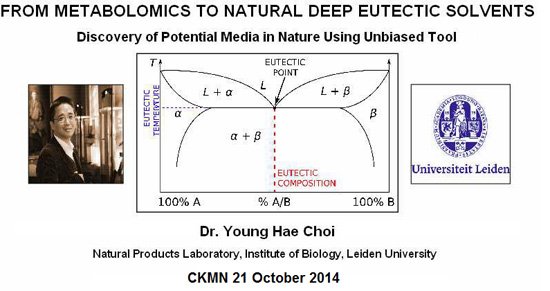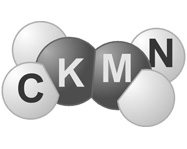| Spreker: | dr. Young Hse Choi |
| Datum: | 21 oktober 2014 |
| Aanvang: | 20:00 uur |
| Locatie: | Kruytgebouw Universiteit Utrecht, zaal W728/729, Padualaan 8, Utrecht (Uithof) |

Samenvatting:
The pool of metabolites (the metabolome) in an organism is the total end product of gene expression. The metabolome is also affected by external stimuli e.g., environmental changes, pathogen attack, or exposure to chemicals. The analysis of the total metabolome, so-called metabolomics, is a new trend in biology to chemically define the phenotype of the organism. In the view point of technology metabolomics does not require any specific technology but the aim, differently from classical metabolic study, should be unbiased.
The group of natural products laboratory in Leiden University has been working for the metabolomics over 15 years, particularly for plants. Using the tool of metabolomics the group has found several important biological issues e.g. bioactive metabolites in the mixture, metabolites involved in plant defense mechanism, and chemo-marker for chemotaxonomy. Of the discoveries I would like to introduce natural deep eutectic solvents in this presentation.
To date, it has been generally accepted that all enzyme-mediated reactions and biosynthesis involved in living organisms occur in medium that is basically composed of water or lipids. However, a very obvious question arises: as the water or lipid solubility of metabolites is often poor, how can organisms, particularly plants which produce a broad range of primary and secondary metabolites, control biosynthetic processing and transportation in an all-aqueous or lipid media? Recently, we found that many combinations of the solid compounds abundant in plants – such as sugars, amino acids and organic acids – become liquid under a certain condition. I detected more than 100 combinations of solids that form liquids. Physically they are classified as natural deep eutectic solvents (NADES). Many metabolites dissolve 10-100 times better in these newly discovered liquids than in water or lipids. The discovery of these non-toxic solvent alternatives to water has far-reaching consequences for prevailing views of plant physiology and biochemistry. It has led us to give answers on how organisms deal with their non-water or lipid soluble metabolites, how plants survive extreme drought or cold, and how seeds can survive extremely long dry periods and still germinate.
In this presentation possible answers made by NADES will be discussed.
For this I will focus particularly on the following topics:
- Chemical proof for NADES, correlation between solids to become liquids
- Solubility increase of non-water soluble plant metabolites by NADES
- Enzyme reaction of NADES
At the end of the presentation the perspective of NADES in biology and applied science will also beprovided.
| Curriculum vitae Dr. Young Hae Choi | |
| 2010 – Present | Associate Editor of Phytochemical Analysis |
| 2009 – Present | Universitair Docent (UD), Institute of Biology, Leiden University |
| 2009 – Present | Universitair Docent (Assistant Professor), Section Process Equipment, TU Delft |
| Present | Visiting Professor in Université de Picardie, Amiens, France (for 1 month lecturing per year) |
| 2008 – 2009 | Researcher, Section Process Equipment, TU Delft |
| 2003 – 2008 | Senior Researcher, Division of Pharmacognosy, Section Metabolomics, Institute of Biology, Leiden University |
| 2002 – 2003 | Postdoctoral Fellow, Division of Pharmacognosy, Section Metabolomics, Institute of Biology, Leiden University |
| 2000 – 2002 | R&D Manager, GreenTek 21, Seoul Korea |
| 2000 – 2002 | Postdoctoral Fellow, College of Pharmacy, Seoul National University, Seoul, Korea |

